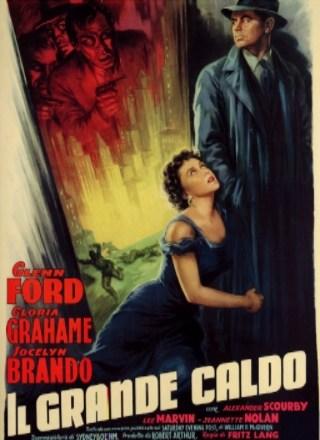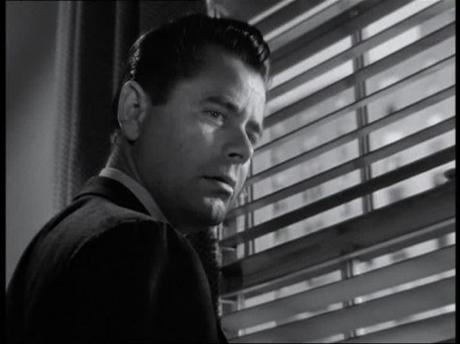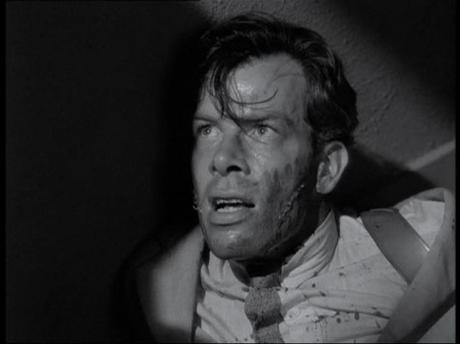
Over the years I’ve spent a fair bit of time talking about film noir, musing over what it is or isn’t and, perhaps inevitably, looking at quite a few borderline cases. I’m still not sure I could articulate exactly what constitutes film noir – although not being able to do so is hardly a big deal – but I do recognize a clear-cut example when I see it. Fritz Lang’s The Big Heat (1953) comfortably fits the bill with its harsh portrayal of a cruel and corrupt world and the merciless way it treats those who would resist it.
The first thing we see is a man reaching for a revolver and then calmly blowing his brains out as he sits at the desk in his front room. His wife (Jeanette Nolan) is alerted by the gunshot and appears shocked, but not too much and certainly not overcome by grief. If anything, she’s drawn more to the document her late husband left behind. The recently deceased was a cop, a dirty one who had been bought and paid for by the mob, and also smart enough to have retained some insurance. As the investigating officer, Bannion (Glenn Ford), remarks, when a cop takes his own life the department is always interested to find out the reason. Initially, there’s no reason to doubt the widow’s claims that her husband was suffering from ill-health and the case looks to be an open and shut one. Even when a girl in a clip joint makes allegations about a less than satisfactory private life, there’s nothing to prove it’s anything other than talk. It’s only after Bannion starts to get gently warned off that he grows more suspicious. As the underworld flexes its muscles and reveals the violence that has been lurking behind the thinnest of veils the full extent of official corruption becomes apparent. Had Bannion been prepared to play the game, matters would have ended there. However, his persistence, and perhaps recklessness or naivety, brings tragedy right into his own parlor. With the whole fabric of his being torn down around him, Bannion moves himself out to the fringes of society where he allows himself to become consumed with hatred, frustration and an unquenchable desire for vengeance.

I’ve never made any secret of the fact I’m a big fan of Fritz Lang, and I’m especially fond of his Hollywood movies. Towards the end of his time in the US the budgets he operated under seemed to shrink but he always had a talent for economy in his storytelling anyway. The Big Heat exemplifies this neatly in the no-nonsense way it plunges headlong into the tale from the very first shot. The whole movie is a lean affair, pared down to its essentials visually, thematically and in terms of dialog too. There’s no waste – not a word nor a gesture appears which doesn’t serve to drive the narrative on. Even the central idea (that of institutional corruption, an increasing staple of 50s film noir) is addressed in direct, matter-of-fact terms.
One of the most interesting aspects, for me at least, was the contrasting portrayal of family life on view. We’re introduced to Bannion’s domestic setup early on and it’s an attractive one, defined by the affection and banter between the detective and his wife (Jocelyn Brando) and the simple yet wholesome way they’re living. Later, when we’re introduced to the chief mobster, Lagana (Alexander Scourby), it’s a very different world which is presented. Where Bannion’s home is a relaxed place filled with informal conversation, Lagana’s mansion feels like a mausoleum of respectability, a soulless place where no hint of “dirty” talk is tolerated.

The other notable point to be made about The Big Heat is the frank way that violence is depicted. There’s real brutality in the actions of the mob and its principal enforcer (Lee Marvin), a sadistic pleasure derived from the infliction of pain and suffering. The film came along quite early in Marvin’s career and gave him the kind of role that was something of a gift for a young actor. In another of those instances of mirroring Ford’s honest cop is driven right to the brink of sanity and morality – he comes to embrace violence with almost the same gusto as Marvin’s sociopath. The crucial difference here though is that Ford draws himself back before he fully succumbs to his basest instincts. Actually, it’s a very solid part for him, requiring him to exercise a fair bit of range as his character travels along the painful arc from contented family man, through heartbreak and loss, to cold avenger. He’s partially saved or redeemed by his own innate decency, but an even more significant influence is provided by Gloria Grahame’s unfortunate moll. It’s her actions and what happens to her that breaks everything wide open, giving Ford his first real leads and also reawakening his ability to identify and empathize with people again. Ultimately, while The Big Heat is a film which sees very bad things happen to people, its message is a positive one about human nature. Sure society has its share of rottenness and violence may be lurking just round the corner, but decent people remain so at heart and there are always those willing to lay it on the line to help others.
There was a time when it was difficult to see all of Fritz Lang’s films, although that’s no longer the case. Even back in the days when one had to search around for his stuff The Big Heat was one of the more accessible titles – I think it may actually have been one of the first films by the director I ever saw, at a time when his name wouldn’t have registered with me. Now there are a variety of DVDs and Blu-rays available from different territories so there should be no problem finding a suitable copy of the movie to view. I would imagine that most people with even a passing acquaintance with Lang will be aware of this film – it’s generally well regarded and the casting probably helps. Needless to say, it’s highly recommended for anyone who has yet to view it.
